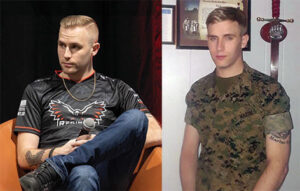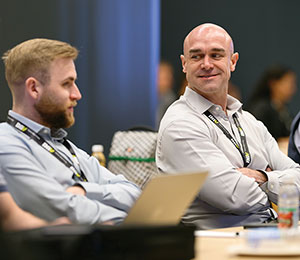
Chris Earl picked up his first video game controller when he was 3 or 4 years old. By age 11, he was playing competitively. At 18, he qualified for a professional gaming league.
At the time, Earl had another opportunity: the Marine Corps. Faced with choosing between a career in gaming and military service, he chose the Marines.
During his four-year enlistment as a logistics/embarkation specialist, Earl continued gaming and competing in tournaments. His hobby fit right in with an institution where gaming is a common pastime for service members and veterans.
So it’s no surprise that before he separated, Earl started building the foundation for what became the country’s largest military gaming community: Regiment Gaming.
“We use online gaming as a means to unite veterans, build community, build camaraderie, provide a sense of belonging and ultimately prevent suicide,” Earl said.
Advocates and health care providers increasingly acknowledge the mental health benefits of gaming for veterans. Gaming also provides a way to reach veterans with information about earned benefits and health care resources. That’s why last year, DAV launched a channel on the gaming and livestreaming platform Twitch.
But in addition to benefiting from the medium, veterans like Earl are helping to shape the gaming industry as innovators and business founders. And like Earl, they’re taking advantage of DAV Patriot Boot Camp’s no-cost programming for entrepreneurs in the military and veteran community.

Earl and Navy veteran Salem Thyne attended a three-day cohort of DAV Patriot Boot Camp in Washington, D.C., last fall.
Thyne spent more than 11 years in the Navy working in the nuclear program and left as a senior chief petty officer. After separating, he worked in the same field before joining his family’s oil and gas startup.
During a brainstorming session one Friday, a colleague told him about an innovative company in France that offered in-person esports anchored in virtual reality. It’s a newer, less-tested concept in the U.S., but once peers expressed enthusiasm for the idea, Thyne found his next venture.
Now he’s the manager and president of Middle Initial LLC, a company bringing Esports Virtual Arenas (EVA) from France to the U.S. Based in Texas, the one-of-a-kind facility is akin to a gymnasium where gamers wearing virtual reality headsets walk, run, duck and jump through the physical space to navigate the virtual space they’re seeing.
“You’re fully immersed,” Thyne said.
Thyne regularly witnesses people coming together over the shared experience, buzzing with energy and thriving among community.
“I see that light in their eyes again that I think we really were missing and we’ve been missing for the last couple years … coming together and just having fun,” he said.

Thyne reached out to Earl, looking for ways to bring the EVA experience to veterans and to support Regiment Gaming’s mission. Given the isolation and struggles that can come with post-military life, Thyne sees immense potential in what gaming can do for veterans.
He also sees the benefit of veterans influencing the gaming industry, noting that many of them played games—whether video or card games—in the military. That means they are keenly familiar with the social and mental health benefits of gaming.
“And I think that that understanding of what it brought you in the military, and then being able to translate that into this market, is super important,” he said, adding that service also equips veterans with leadership and life skills unlike anything else.
Branden Duncan served four years in the Air Force working in electronic warfare control systems. Afterward, the lifelong gamer got a degree in electrical engineering.
All those experiences uniquely prepared him to create Hedgehog, a gaming mouse with customizable knuckle and finger buttons that also operates as a flat-plane joystick. While Duncan said the gaming device market is saturated, there’s really nothing like what he’s designed.
Duncan plans to manufacture and sell the Hedgehog in 2025. It took longer for him to get to that point than he expected, but his military service prepared him for the sometimes-rocky journey of entrepreneurship.
“I think it gave me a lot of adaptability,” he said.

Duncan attended DAV Patriot Boot Camp in 2022 and credits its experts and mentors with steering him in the right direction to pursue funding. It helped him get to where he is today, and he hopes to attend a future cohort when he’s ready to take Hedgehog to the next stage.
“All three of these alumni illustrate the value of veterans as business founders and the positive impact they can have on an industry,” said DAV National Adjutant Barry Jesinoski. “DAV Patriot Boot Camp is honored to support them on their journeys. When veterans succeed, it benefits more veterans and entire communities.”
Learn more about DAV Patriot Boot Camp at patriotbootcamp.org.



